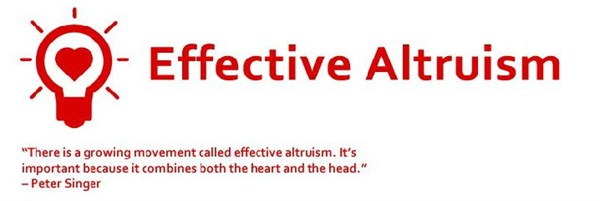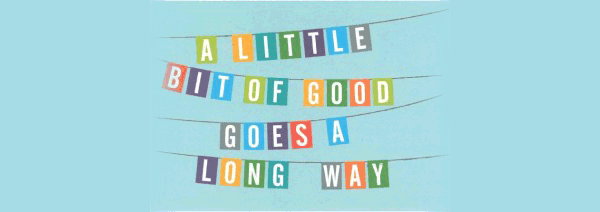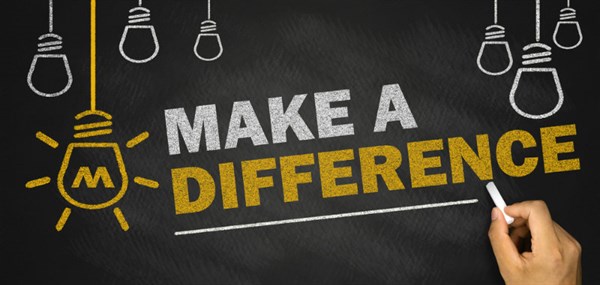How to be a better hero than Batman
07 Oct 2016 | Michael Plant

Batman is obviously a hero. Despite being a billionaire who
could safely watch from his mansion as Gotham burns, he decides to
put himself at huge personal risk. He learns martial arts, buys
some very expensive gear, then goes toe-to-toe with the city's
lowlifes to fight crime one punch at a time.
But hold on. Bruce Wayne is a billionaire. And he's fighting
crime himself, one person at a time. A billionaire. If he really
wanted to tackle Gotham's crime problems, he's not actually being
very effective.
He could use his inheritance to hire more policemen, to fund
investigative reporting into bureaucratic corruption, to campaign
for the closure of Arkham Asylum or to finance mental health
support. Or he could do what his father did and invest in major
infrastructure projects.
Are you saying you wouldn't watch a movie where Bruce Wayne
carefully decides which civic projects to fund?
Fine. I'll admit that wouldn't be a blockbuster. But, I think we
should accept our intuitions about how to do good can be pretty
misleading in our modern, complicated world.
If invited to a soiree at Wayne Manor, I'd suggest to Bruce
should be less caped crusader, more Effective Altruist.
What's Effective Altruism? It's a philosophy and
social movement that encourages people to use their time, money and
careful reasoning to help others as much as possible.
Bill Gates is one advocate. So is Mars-man Elon Musk. As are philosophers like Peter Singer, Toby Ord and Will MacAskill.

We all have a huge
opportunity
Imagine you saw a child in a burning building and acted like
Batman: kicked down the door, saved the child and returned it to a
grateful, crying mother. You'd feel awesome. It might be the best
day of your life. Imagine you did that every year of your life.
You'd feel like you'd made a pretty special contribution.
Effective altruists argue we can all have this sort of impact.
The easiest way to see this is with charity. If you are on the UK
median wage of £27,600 you're in the richest 2.5% in the world. You
earn more than 26 times the global average, even if it's doesn't
feel like that. And if you earn £52,000 you're in the top 0.1% of
the world (use this tool to see how rich you are).
You could donate 10% of your annual income to the Against
Malaria Foundation, which distributes bednets to protect some
of the world's poorest child dying from malaria. Charity evaluators
GiveWell and
Giving
What We Can rate it as one of the world's most effective
charities, and estimate you'd save a life for every £2,600 spent.
In fact, even after that donation, someone on the UK median wage
would still be in the richest 3.1% of the world's population. This
doesn't feel as heroic as rushing into the burning building, but
it's equivalent in terms of impact.

Doing good better
Effective altruists argue doing we need to be clever about doing
good: some efforts fail, whilst the best are much better than the
rest.
For example, Scared Straight is a still-popular American
programme that takes teenage delinquents on prisons tours. The
thinking is simple: once they see how bad life is on the inside,
young offenders will mend their ways. However, studies have found Scared Straight increases
rates of criminality and estimate that each $1 spent on the
intervention cost society $200.
And a study of Scots doing sponsored skydives for
charity found that so many first-time jumpers injured themselves on
landing that every £1 raised cost the National Health Service
£13.75. The jumpers would have done more good staying at home.

However, amongst programmes that are shown to be effective, some
are hugely more effective than others. For instance, suppose you
wanted to help blind people. $40,000 could pay for one guide dog for a
blind person. You might think that's a good deal.
Alternatively, you could fund the treatment of trachoma, a
bacterial eye infection that causes blindness, for patients in
Africa. Trachoma procedures use anti-biotics and cost around $20 per patient, which means if your objective
is helping blind people, it's 2,000 times more effective.
Some people find this surprising, but the explanation is
straightforward. We've already funded all the cheap, easy
treatments for our own citizens and we're left trying to solve
expensive, complicated problems like cancer. This isn't true in the
developing world, where health care can often be non-existent.

Where to focus?
With so many problems in the world, it can be hard to know where
to start. Effective altruists suggest it makes sense to assess
problem by their scale (how many suffer and how much?),
neglectedness (is anyone doing something about this?) and
tractability (how easy is it get stuff done?).
Counting paperclips might be easy and neglected, but it won't
make a difference. And you'd save lives if you reformed US gun
laws, but it would be a waste of time to try.
Generally speaking, three problems come out on top:
Poverty and health in the developing world. 900 million people live under the World Bank's
poverty line of $1.90 per day. Many health conditions that
afflict these people could be cheaply treated, which is why the
Against Malaria Foundation is so highly rated.
Animal suffering. Around 65 billion farmed
animals exist and factory farming causes huge misery to chickens,
pigs, cows, etc. Switching to vegetarianism or veganism and
advocating for better treatment on animals could prevent lots of
suffering.
The future of humanity. Global pandemics,
asteroid strikes, nuclear war or, potentially, artificial
intelligence, present big threats because they could wipe out
humanity.
From my own research, I think these two are as
important:
Mental illness. The evidence suggests mental
illness is a bigger predictor of unhappiness than anything
else: poor physical health, low income, unemployment, etc. It's
also not clear that, as surprising as this seems, lifting people
out of poverty does much to help their symptoms of depression or increase overall life satisfaction over the long-term.
As a result, I think it makes more sense to target misery, not
poverty, and focus on improving mental health directly.
Ordinary human unhappiness. Normal life has
worry, fear, sadness and sorrow. When you consider this effects
everyone, that's a huge amount of lost happiness. The reason I
think Action for
Happiness is a great organisation is because almost no one else
is trying to tackle this.

The five highest impact ways you can do
good
Now that we've done a quick scan the world's worst problem, here
are the most promising ways I think anyone can do good.
1. Donate to the best effective charities
Giving
What We Can is a charity that encourages people to, as the name
suggests, give what they can to the best charities. They suggest
you pledge 10% of your income, or 1% if you're a student.
Top picks include the Against Malaria Foundation (anti-malarial
bednets) and Give Directly (which sends cash transfers to
those in poverty).
On the basis of my research, I think Basic Needs,
which runs cheap, effective group therapy for mental illness in the
developing world, is currently the most cost-effective way to
increase world happiness.
2. Find a high impact career
The Batman example showed direct action isn't always the best
option. 80,000
Hours, named after the number of hours in working life, is a
charity that advises people on how to have high-impact careers.
Working alongside Oxford academics, they've been researching this
for the last 5 years.
Whilst it's quite hard to give career advice because everyone is
different, in general they think the best ways to have an impact
are:
- Earning money to give to effective charities
- Conducting research into important topics (e.g. wiping out
mosquitos)
- Becoming a campaigner for social change (think William
Wilberforce arguing to abolish slavery)
- Direct work, such as starting a company that solves a social
problem, or doing effective non-profit work.
If you want to know more I'd suggest you start with their short
career quiz and see what they recommend for you.
3. Become an advocate or community
volunteer
Suppose both you and I see hundreds of children trapped in a
burning building. I'm scared, but you convince me to run in with
you. By persuading me you effectively save twice as many children
as if you were acting alone. Advocacy can be very powerful, so
starting or joining an effective altruism group is one good
option.
Alternatively, you could run an Action for Happiness
course (honestly they're not paying me, but they should).
4. Eat less meat
Factory farming causes lots of unnecessary suffering. If you
don't want to go vegetarian or vegan, think about eating less
meat.
5. Vote for effective politicians
Finally, vote for politicians that are interested in effective,
evidence-based policies. If you hear someone arguing we should do
more to tackle poverty, mental illness, animal welfare or the
long-term future of humanity, vote for them. They're probably
better than the other lizard.
If you follow these five ways, you'll do a lot more good than
Batman. You won't look as sexy, but then you can't have
everything.
About the author

Michael Plant researches the nature and causes of happiness for a PhD in
Oxford's Philosophy Department. He's also the CEO and Co-Founder of
Hippo, the
FitBit for your mind.
Further reading